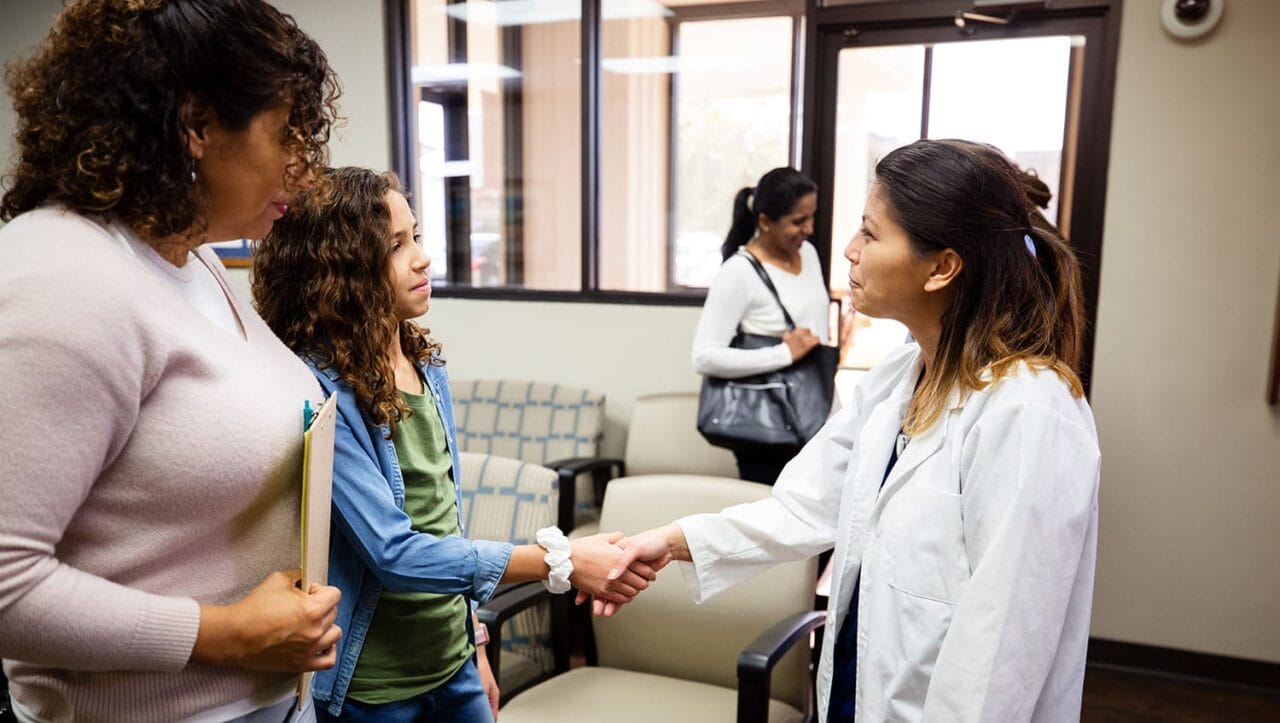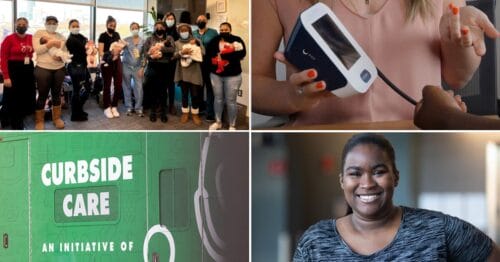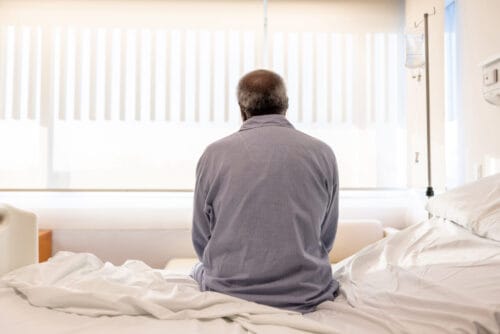
Getty Images
Boston Medical Center’s Katherine Gergen Barnett, MD, weighs in on how essential it is to include underrepresented perspectives in clinical research.
Improving racial representation in clinical trials remains a significant challenge for medical researchers. Of the clinical trial participants for the 53 new FDA-approved therapies approved in 2020, only 8% were Black compared to 75% white. This stark disparity in representation not only tells a story about medical mistrust but also the persistent barriers and biases that continue to limit access to medical progress for historically disadvantaged communities. Inclusive research is fundamental for health equity and ensuring diverse representation in clinical trials is a critical step forward.
Katherine Gergen Barnett, MD, vice chair of Primary Care Innovation and Transformation at Boston Medical Center (BMC), has been on the frontlines of care as a family medicine physician for nearly 20 years. She treats many children and adults who suffer from chronic conditions, such as asthma, hypertension, and obesity — conditions that put them at greater risk for poor outcomes from infections. The disparities in health outcomes — both morbidity and mortality — as well as vaccine uptake in these communities during the COVID-19 pandemic drove Gergen Barnett to investigate the ways that systemic racism and medical distrust continue to drive health inequities. Now a principal investigator (PI) for a pediatric clinical trial on the efficacy of Paxlovid — a medication developed to mitigate severe COVID-19 symptoms — she has a unique viewpoint of the intersection between the advancements in medicine, the families most medically and socially at risk of poor health, and the pursuit of inclusive research that promotes better outcomes for all.
HealthCity recently interviewed Gergen Barnett to discuss her work, the barriers involved in enrolling high-risk pediatric patients in clinical trials, the balance between individual benefit and medical advancement, and how building trust between providers and patients is essential to advancing health equity.
HealthCity: As a family medicine practitioner, how did you become involved in clinical research?
Katherine Gergen Barnett, MD: During the pandemic, I began actively writing about what we were witnessing on the front lines and the ways in which social, political, and economic issues were impacting health outcomes in our communities. When I first wrote about issues of medical mistrust, a phenomenal community organization called Everyday Boston, which works to promote community conversation around storytelling reached out to me. Together, we began writing grants to study how to bring their tools of storytelling and community conversation to questions of medical mistrust.
The Clinical Research Network supports BMC’s goal of providing innovative, equitable healthcare, promoting community-engaged research values, offering staffing services for institutionally prioritized or under-resourced clinical trials, and nurturing research development. They learned about this work around trust-building, and they became very interested in partnering with me. Though I had never imagined that my community engaged research and writing would lead me to be a clinical trial investigator, I saw clearly the impact of historical and present day medical mistrust in enrollment in clinical trials and I agreed to become a principal investigator for a clinical trial on Paxlovid for use in children medically at risk for poor outcomes from COVID-19. Thankfully, I have been surrounded by amazing colleagues in this work, and the Clinical Research Network has really supported me.
Much of what happens in a clinical trial for a child requires direct communication with the caregiver. Interestingly, working as a family medicine doctor and taking care of people of all ages also turned out to be the perfect confluence in this work as not only do we have layers of trust built with families, but we also have individual relationships with parents and caregivers of our pediatric patients.
HC: The health system as a whole is complicit in a lack of diversity of clinical trials, with potential bias and a historical lack of outreach. On the side of potential participants, what are the unique challenges of enrolling youth from historically marginalized communities in clinical trials?
KGB: Medical distrust is one valid reason; however, there are many other barriers as well. Clinical trials often require people to take hours off work or travel far distances. Pediatric clinical trials compound both issues. Caregivers of youth not only have to take off all that time from work but also have an added layer of heightened worry of enrolling a child. With a child, it is not just about keeping themselves safe, but also this precious human being safe. It is sometimes challenging to communicate and understand why enrolling in a clinical trial might benefit a child beyond the betterment of biomedical information and increasing diversity in trials.
HC: How are families typically approached about a clinical trial for a child?
KGB: Engaging children who can’t consent on their own to be in a clinical trial has so many more layers of complication but also opportunity. The opportunity is that you’re getting to work with more community members and discuss why a clinical trial could be advantageous to the patient. But also, there’s increased concern, especially around COVID-19, which created a lot of heightened fears and mistrust. You must break down all the different layers of what is safe and effective in a child, and there is a lot you must do to ensure that the child stays safe throughout the duration.
One patient, Ajahnee, and her family are the perfect example of the overlap between trust and enrollment in a clinical trial. I have the good fortune of caring for Ajahnee, her sisters, and her mother for years and I know them all very well. Her mother reached out to me, sharing that Ajahanee, who has several medical risk factors, was sick with COVID-19. I was able to share with her about an open clinical trial.
Ajahnee Brown Sampson was the first pediatric patient to participate in a clinical trial at Boston Medical Center for people at high risk of developing COVID-19. “I don’t know if I would be sitting here talking to you right now if I didn’t get this medicine,” she says about receiving Paxlovid though a clinical trial. (Video via Everyday Boston)
My team talked with her mother at length because I didn’t want my relationship to sway her as to whether she should enroll her daughter. But I do feel strongly that it was because Ajahanee and I have a relationship that she agreed. She knew that I had her best interest at heart and that I would never want her to be part of a clinical trial if I did not believe it would benefit her. She became the first participant to be enrolled at Boston Medical Center.
HC: What do you feel the role of a physician is in building trust in research and medicine, especially among people of color? What is the impact of trust?
KGB: Building and maintaining trust with my patients is one of the most important things I can do to help heal individuals and work to heal communities. In those individual relationships, I hope my patients come to trust medicine and institutions more. But it’s not on communities of color to trust us. It’s on doctors and providers to be trustworthy. So, how do we continue working with clinicians and clinicians-in-training to learn from community members about how to be more trustworthy? Trust is so profound and it’s so radically important. It’s also difficult as it’s not a hard science, but you can’t do hard science without also doing relationship building. The two have to go hand in hand.
The National Academy of Science recently discussed the importance of including marginalized communities in clinical trials. There was one powerful randomized study where two different groups of patients with hypertension were given the results of two different clinical trials testing high blood pressure medications. One of the clinical trials had enrolled 15% or more Black patients and one had enrolled only 1% Black patients. Black patients who were exposed to the clinical trial with 15% or more representation were 20 times more likely to be interested in that hypertension medication.
Fundamentally, trust travels from person to person. If you see people like yourself or people you trust more in a clinical trial, you also are more likely to trust that clinical trial. And perhaps, if there are clinical trials you can trust more, you may be more likely to trust medical institutions that are running those clinical trials.
*This interview has been edited and condensed for clarity and length.


